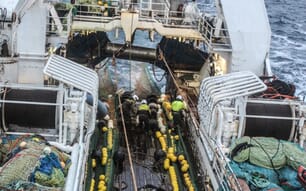Climate change could force some species of fish to move north in search of colder waters to be replaced by species not traditionally caught or farmed in UK waters, says Professor Mike Elliott, Director of the University’s Institute of Estuarine and Coastal Studies (IECS).
Professor Elliott was commenting as the University announced its role in a multi-national European research project to understand how climate change will affect Europe’s fish and shellfish resources and the economic activities that depend on them.
The Climate Change and European Aquatic Resources project, known as CERES, aims to help fisheries and aquaculture sectors in marine and inland waters adapt to anticipated changes in the climate.
Experts say that urgent action is needed to safeguard long-term food security against a background of global warming.
The University’s primary role will be to assess not only the risks but also the opportunities for fisheries and aquaculture as fish stocks move further north and new species take their place.
Professor Elliott, who is leading the Hull team on the CERES project, said: “Climate change could mean that we don’t catch as many cod, haddock and plaice as we do now.
“Cold water species will move further north and in the next century we might not be able fish for them any longer. However, something else will take their place. A couple of decades ago, anchovies were rare in our waters but now we catch them in the North Sea.
“There’s a risk we will lose species but one of the things CERES is looking at is the opportunities for catching and farming new species.
“Warming waters brings risks, such as ocean acidification and sea level rise, but the growth potential of species and marine productivity may increase. In the next century we may be catching and culturing species that we have not even thought about yet. Therefore we need to make sure that fisheries and aquaculture are able to take advantage of these changing circumstances.”
Professor Elliott said that climate change will mean that in the future people will be eating different species than they are now.
He added: “People are already eating Vietnamese catfish instead of cod or haddock with their chips, and we also now eat orange roughy, or deep sea perch. We now farm the non-native species the Manila clam in the south of England and, in the future, instead of using small sprat or herring for whitebait, we could be eating little anchovies instead.”
The four-year CERES project is being coordinated by the University of Hamburg with funding of more than £4m from the European Commission’s Horizon 2020 Research programme.
Using the latest science, CERES will predict the distribution and production of major fish and shellfish species in different European regions.
One of the main priorities will be to identify opportunities for new aquaculture and fisheries into the next century, the so-called Blue Growth agenda, including new species and methods of production.
The University of Hull research team includes staff from IECS as well as experts from the Hull International Fisheries Institute, the Hull University Business School (HUBS), the Law School and the Politics and International Studies Department.
Dr Anita Franco, Senior Fish Ecologist in IECS, said: “The University’s team will apply industry-derived risk management tools linked to computer models to assess fishery and aquaculture opportunities resulting from climate change scenarios.
“The analysis will look at the vulnerability and knowledge gaps for data-poor fisheries and aquaculture sectors, where quantifying the impacts of climate change on both the biological and economic performance are not yet possible.”
The CERES project will involve 125 scientists 26 European countries as well as 15 from non-European countries, including the USA and Canada.
The project has contributions from oceanographers, hydrologists, modellers, ecologists, aquatic physiologists, social scientists, economists, fishermen and fish and shellfish farmers.
Professor Myron Peck, of Hamburg University, the CERES Coordinator said: “The EU requires fishing and aquaculture to be environmentally sustainable, economically viable and socially acceptable. It has to provide long-term European food security given prevailing and future climatic conditions.
“Climate change will affect the way we achieve these ambitions and so a greater understanding is urgently needed to ensure that management measures remain appropriate and achievable.”




